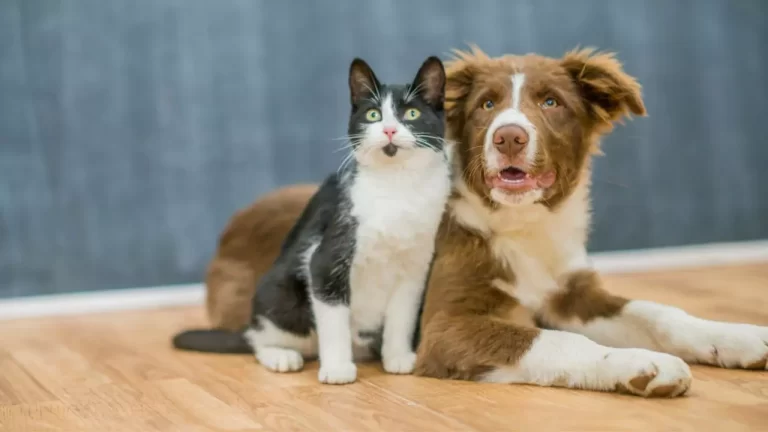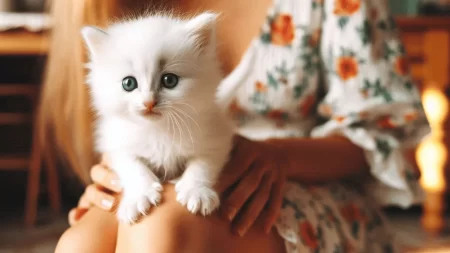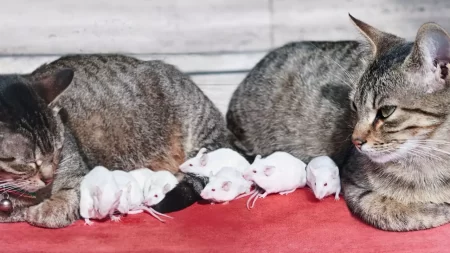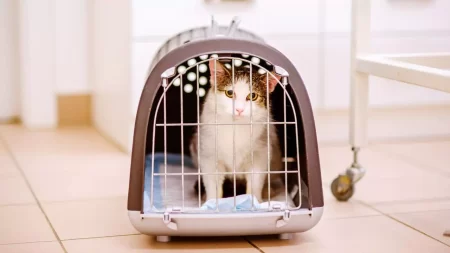The answer to this question is no. A cat cannot get pregnant from a dog, and a dog cannot get pregnant from a cat. Cats and dogs are different species with incompatible genitalia. They also have different DNA and breeding behaviors. A dog’s sperm cannot fertilize a cat’s egg.
In this article, we will explain why cross-species pregnancy is not possible between cats and dogs, and what are the risks and complications of attempting such a thing.
Understanding Reproductive Biology of Cats and Dogs
Cats and dogs have different reproductive anatomy, timing of heat cycles and fertility, and ability to breed and produce offspring. These differences make it very unlikely for them to mate successfully, let alone conceive and give birth to healthy offspring.
Differences in Reproductive Anatomy
The reproductive organs of cats and dogs are not compatible with each other. Cats have a narrow and curved vagina, while dogs have a long and straight penis. Dogs also have a bulbous gland at the base of their penis, which swells and locks inside the female’s vagina during mating. This is called a “copulatory tie” or a “knot”, and it can last from 5 to 30 minutes. This mechanism ensures that the sperm is deposited deep inside the female’s uterus, and prevents other males from mating with her.
Cats, on the other hand, do not have a copulatory tie. Their mating is brief and often violent, lasting only a few seconds. The male cat’s penis has barbs or spines, which stimulate the female’s ovulation and cause pain and bleeding. The female cat may scream and attack the male after mating and may mate with several males in a short period of time.
These anatomical differences make it very difficult for a cat and a dog to mate in the first place, as they would not fit together properly, and would cause pain and injury to both parties.
Timing of Heat Cycles and Fertility
The heat cycle is the period when a female animal is receptive to mating and can become pregnant. Cats and dogs have different heat cycles, which affect their fertility and behavior.
Cats are induced ovulators, which means they only ovulate when they mate. They can have multiple heat cycles throughout the year, depending on the season, the daylight hours, and the presence of males. A cat’s heat cycle can last from 3 to 14 days, and she can mate with multiple males during this time. A cat can become pregnant at any time of the year and can have up to four litters per year, with an average of four kittens per litter.
Dogs are spontaneous ovulators, which means they ovulate regardless of mating. They usually have two heat cycles per year, one in the spring and one in the fall. A dog’s heat cycle can last from 2 to 4 weeks, and she can only mate with one male during this time. A dog can only become pregnant during a specific window of time, which is around the 10th to 14th day of her heat cycle. A dog can have up to two litters per year, with an average of six puppies per litter.
These differences in timing and frequency of heat cycles and fertility make it very unlikely for a cat and a dog to mate at the same time, and even if they do, the chances of conception are very low.
Ability to Breed and Produce Offspring
Breeding depends on parental genetic compatibility. Different Carnivora families split from a common ancestor millions of years ago, separating cats and dogs. The Felidae family includes cats, while the Canidae includes dogs. Genetic information is carried by chromosomes, which vary in number. Felines have 38 chromosomes, while dogs have 78. Since their genes are not matched, they cannot share or mix genetic material.
Although a cat and a dog could mate and conceive, their progeny would not survive or reproduce. The offspring would have an aberrant amount of chromosomes, causing serious developmental and health issues. Usually infertile, hybrid children cannot reproduce.
Possibility of Cross-Species Pregnancy
Cross-species pregnancy is the term used to describe the phenomenon of a female animal carrying and giving birth to offspring that are not of the same species as her. This is very rare and usually occurs due to artificial insemination or genetic engineering. However, there are some cases of natural cross-species pregnancy in the animal kingdom, such as the following:
- A mule is the offspring of a male donkey and a female horse. A mule has 63 chromosomes, which is the average of the parents’ 62 and 64 chromosomes. Mules are usually sterile, but there have been a few cases of female mules producing offspring with either a horse or a donkey.
- A liger is the offspring of a male lion and a female tiger. A liger has 38 chromosomes, which is the same as the parents’ 38 chromosomes. Ligers are usually sterile, but there have been a few cases of female ligers producing offspring with either a lion or a tiger.
- A zorse is the offspring of a male zebra and a female horse. A zorse has 54 chromosomes, which is the average of the parents’ 44 and 64 chromosomes. Zorses are usually sterile, but there have been a few cases of female zorses producing offspring with either a zebra or a horse.
These examples show that cross-species pregnancy is possible between closely related species that belong to the same genus or family, and have similar numbers of chromosomes. However, cross-species pregnancy is not possible between distantly related species that belong to different families or orders and have vastly different numbers of chromosomes. Therefore, cross-species pregnancy is not possible between cats and dogs, as they are genetically different from each other.
Risks and Complications of Cross-Species Pregnancy
Cross-species pregnancy is not only impossible but also dangerous and unethical. There are many risks and complications associated with cross-species pregnancy, both for the mother and the offspring. Some of these are:
Potential Health Risks for both the Mother and Offspring
Cross-species pregnancy can cause physical and mental stress, infections, miscarriages, stillbirths, deformities, diseases, and death for both the mother and the offspring. The mother’s body may reject the foreign fetus, or the fetus may not develop properly due to the incompatible genes. The offspring may suffer from genetic abnormalities, immune deficiencies, behavioral problems, and reduced lifespan.
Increased Risk of Genetic Abnormalities
Cross-species pregnancy can result in offspring that have an abnormal number of chromosomes, which can cause various genetic disorders and defects. Some of these are Down syndrome, Turner syndrome, Klinefelter syndrome, and Cri du chat syndrome. These disorders can affect the physical and mental development, appearance, and health of the offspring, and may also prevent them from reproducing.
Ethical Considerations
Cross-species pregnancy can raise ethical questions and concerns, such as the following:
- Is it morally right to create hybrid animals that may suffer from physical and mental problems, and may not have a natural place in the ecosystem?
- Is it fair to use animals as tools or experiments for human purposes, such as entertainment, research, or breeding?
- Is it respectful to the dignity and rights of animals to interfere with their natural reproduction and evolution?
These questions and concerns show that cross-species pregnancy is not only unnatural but also unethical. It violates the principles of animal welfare and conservation and may have negative impacts on the environment and biodiversity.







